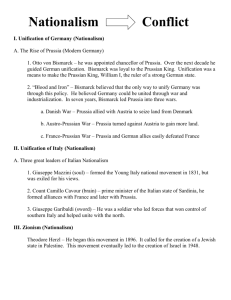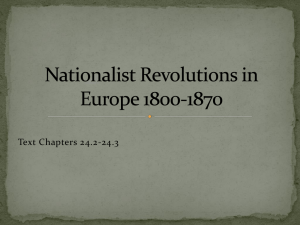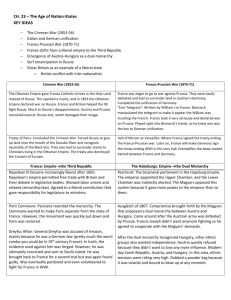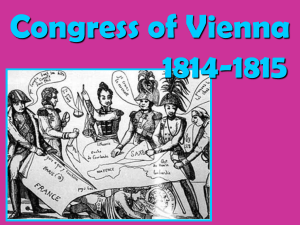An Age of Nationalism and Realism 1850 – 1871
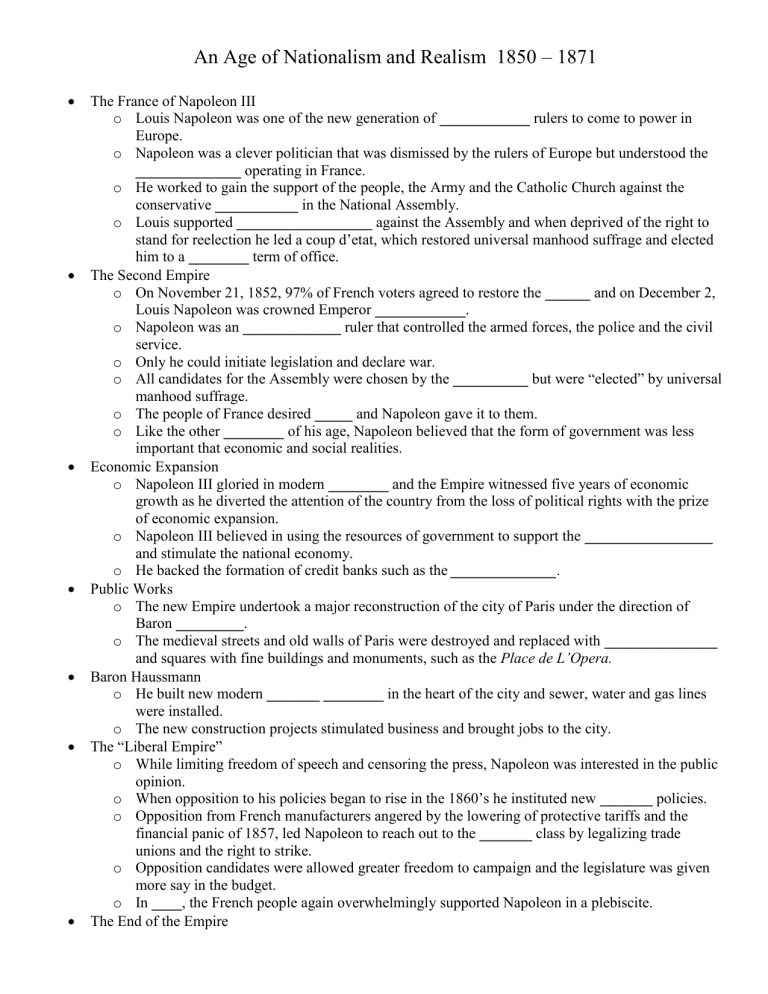
An Age of Nationalism and Realism 1850 – 1871
The France of Napoleon III o Louis Napoleon was one of the new generation of ____________ rulers to come to power in
Europe. o Napoleon was a clever politician that was dismissed by the rulers of Europe but understood the
______________ operating in France. o He worked to gain the support of the people, the Army and the Catholic Church against the conservative ___________ in the National Assembly. o Louis supported __________________ against the Assembly and when deprived of the right to stand for reelection he led a coup d’etat, which restored universal manhood suffrage and elected him to a ________ term of office.
The Second Empire o On November 21, 1852, 97% of French voters agreed to restore the ______ and on December 2,
Louis Napoleon was crowned Emperor ____________ . o Napoleon was an _____________ ruler that controlled the armed forces, the police and the civil service. o Only he could initiate legislation and declare war. o All candidates for the Assembly were chosen by the __________ but were “elected” by universal manhood suffrage. o The people of France desired _____ and Napoleon gave it to them. o Like the other ________ of his age, Napoleon believed that the form of government was less important that economic and social realities.
Economic Expansion o Napoleon III gloried in modern ________ and the Empire witnessed five years of economic growth as he diverted the attention of the country from the loss of political rights with the prize of economic expansion. o Napoleon III believed in using the resources of government to support the _________________ and stimulate the national economy. o He backed the formation of credit banks such as the ______________.
Public Works o The new Empire undertook a major reconstruction of the city of Paris under the direction of
Baron _________ . o The medieval streets and old walls of Paris were destroyed and replaced with _______________ and squares with fine buildings and monuments, such as the
Place de L’Opera.
Baron Haussmann o He built new modern _______ ________ in the heart of the city and sewer, water and gas lines were installed. o The new construction projects stimulated business and brought jobs to the city.
The “Liberal Empire” o While limiting freedom of speech and censoring the press, Napoleon was interested in the public opinion. o When opposition to his policies began to rise in the 1860’s he instituted new
_______ policies. o Opposition from French manufacturers angered by the lowering of protective tariffs and the financial panic of 1857, led Napoleon to reach out to the _______ class by legalizing trade unions and the right to strike. o Opposition candidates were allowed greater freedom to campaign and the legislature was given more say in the budget. o In ____ , the French people again overwhelmingly supported Napoleon in a plebiscite.
The End of the Empire
o _______ policy failures culminating in a loss in the Franco-Prussian War would bring an end to the Empire and the creation of a new republic.
The Crimean War o Louis Napoleon claimed that the Empire stood for peace, but being a _________ it was perhaps inevitable that he would lead the county into war in the Crimea. o This war would have a significant impact on the ___________ movements in Europe by weakening both Austria and Russia. o It would also be the first war covered by international _________ correspondents and the first in which women, led by Florence ___________ , established their position as army nurses.
The Causes of the War o The _______ Question – who would benefit from the dissolution of the Ottoman Empire. o Many European countries had designs on Ottoman territories in the Balkans.
Russian Claims o But ______ , with its relations to the ______ peoples, religious bonds with the Eastern Orthodox religion and its geographic proximity, held special opportunities to expand its sphere of influence. o These ambitions were feared by other powers, such as Britain and France that wished to maintain the _______ of _____ and Austria, which of course had its own ambitions in the Balkans. o War began when Russia’s claim to be the protector of __________ in the Holy Land was denied by the French, who encouraged the Turks to resist Russian aggression in Moldavia and
Wallachia. o On October 4, 1853, the Ottoman Empire declared war on ______ . o The following year _______ and ______ will join the war against Russia. o The British navy effectively blockaded Russian ports and the British and French armies landed on the _______ Peninsula. o The war was short-lived but very costly in lives, with over _______ dead – over 60% of them from diseases such as cholera.
The Battle of Balaclava o The Battle of Balaclava included a cavalry charge of Britain’s
_____ _______ led by the infamous Commander James Brudenell. o He was the first man to reach the lines and emerged unscathed, but Russian artillery cut down
503 of his 700 men.
The Charge of the Light Brigade
Half a league, half a league, half a league onward, Into the Valley of Death rode the Six Hundred
Theirs not to make reply, Theirs not to reason why, Theirs but to do and die.
-Alfred Lord Tennyson
The Charge of the Light Brigade (1854).
The Congress of Paris o A Peace Treaty was signed in Paris in 1856, pledging all of the Great Powers to maintain “the integrity of the Ottoman Empire”. o Russia was forced to give up its captured territories in Moldavia and Wallachia, which became the Principality of _______ . o Russia was now enemies with _______ , who had failed to aid Russia, even after Russia had come to their aid in the Revolution of 1848.
Politics of Reality o The Crimean War caused the destruction of the _______ of Europe and created opportunities for
Italian and German national unification. o Napoleon III now saw himself as the _________ of national peoples, but his role the unification of Italy and Germany will prove disastrous for France.
Italian Unification
o Following the defeat of the Italian Risorgimento Movement of Giuseppi Mazzini and Garibaldi, many looked for a more _________ method of achieving unification. o Despite the failure of the Piedmontese to oust the Austrians from Northern Italy, the Kingdom of
Sardinia’s House of
_____ became the leader in the next move toward unification.
Cavour – the Brains o King Victor Emmanuel II named Count Camillo di ______ as Prime Minister in 1852. o Cavour was a liberal minded businessman that admired the British and he encouraged economic development. o Cavour reached an agreement with ________ III, whereby France would help Sardinia in its war with Austria, and Napoleon’s cousin would become King of a Central Italy.
The Battles of Magenta and Solferino o The French army defeated the Austrian in two battles in Northern Italy, but then Napoleon, fearing the _________ , who were mobilizing to come to the aid of the Austrians, made a separate peace with Austria.
The Kingdom of Piedmont o Piedmont-Sardinia was able to annex ________ , but Venetia remained in the possession of
Austria. o Parma, Modena, Tuscany and Romagna rose in rebellion and were also annexed.
Garibaldi – the Sword o Sicilian authorities abort an uprising against the Bourbon monarchy in April but Giuseppe
_________ organizes an army of 1,000 “ _________
” at Genoa and sails for Marsala. o He lands May 11, gathers recruits as he marches inland, defeats the Neapolitans at Calatafimi, takes Palermo, crosses the Straits and, takes Naples. o He supports _______________ II of Piedmont as king of a united Italy. o On March 17, 1861, a new Kingdom of Italy is proclaimed with King Victor Emmanuel II of the
House of Savoy as the new King. o Cavour dies three months later.
The Unification of Germany o Following the failure of the _________ Assembly, the move towards of German Unification became a move by _______ to dominate the other states of the Confederation.
The Zollverein o The Zollverein _______ union was established by Prussia to eliminate tariff barriers and to promote the economic unity of Germany. o It had its beginnings in 1818, and by 1854 its members included all of the German states except
Austria.
Prussian Domination o The legislature of Prussia was elected by a complex voting system where male suffrage was determined by ______________ . o This system left the constitutional monarchy largely in the hands of a growing ____________ that sought to gain even more power from the monarchy.
King Wilhelm o In 1861, Prussian King Frederick William IV died and was succeeded by his brother King
William I. o _______ begins to modernize and expand the Prussian Army. o He instituted three years of compulsory military service for all young men. o The middle-class liberals in the Parliament resisted compulsory service fearing that it might be used to make the youth more obedient to the monarchy. o Kaiser Wilhelm did not want to use the military to force the parliament to agree, but appointed an ultra-conservative Junker, Otto von ________ as his Chancellor.
Realpolitik
o Bismarck was a practitioner of ___________ the “politics of reality” and would pursue either diplomacy or war if it would gain advantage for Prussia.
“The great questions of the day will not be settled by means of speeches and majority decisions . . . but by iron and blood.”
-- Otto von Bismarck o When faced with _______ resistance over army appropriations Bismarck began to operate without Parliamentary approval.
The Wars of Unification o Bismarck created a unified German nation-state by fighting three wars: the Danish War(1864); the Austro-Prussian War (1866); and the Franco-Prussian War(1870-71). o Before fighting each of these wars Bismarck would work ______________ to ensure that Prussia fought against only one enemy and that that enemy was isolated diplomatically.
The Danish War o In 1864, Bismarck went to war with Denmark over the issue of _________ and ________ . o Denmark moved to annex these territories, both of which had large German populations. o Bismarck persuaded _______ to join Prussia in a war against Denmark, which was quickly defeated. o Austria agreed to a _____ administration of the two territories with Prussia – thus creating he potential of friction between the two countries.
The Austro-Prussian War o Bismarck neutralized Russia and France and made an alliance with the new unified state of Italy, promising Italy Venetia if Austria were defeated. o Bismarck, having ________ Austria, then goaded them into war. o Prussia’s superior military, with its breech loading needle gun, easily defeated the Austrians
The North German Confederation o The German states north of the Main River were organized into the ____________
Confederation controlled by Prussia. o The southern German states remained independent but were forced to sign military agreements with Prussia. o Prussia also annexed Hanover, Hesse-Cassel and the free city of Frankfurt which had sided with
Austria in the war. o Bismarck had proven the idea of Napoleon III that ___________ and _____________ rule could be combined. o Bismarck was quoted as saying that people only needed “
_____ and _____
” to keep them happy. o He thus separated the ideals of Nationalism and __________ .
The New German Confederation o The government established by Bismarck allowed each state to keep its own local government, but the King of Prussia was the head of the Confederation. o The military was controlled by the King and his Chancellor. o The new Parliament consisted of two houses: o The _________ , or Federal Council, made up of delegates elected by the states. o The _________ members were elected by universal male suffrage.
The Franco-Prussian War o France was not comfortable with the rising power of a unified Germany.
Napoleon’s Troubles o France’s brief attempt to create an Empire in
______ had failed by 1865. o By 1870, Napoleon III was facing serious ________ problems at home and needed a diplomatic victory.
The Spanish Revolution o A revolution in Spain deposed the Bourbon Queen Isabella II and the crown of Spain was offered to the ____________ Leopold the cousin of King William of Prussia.
o The French, already concerned about the rising power of Prussia, would not agree to have a
______ Prince on the throne of Spain.
The Ems Dispatch o The Hohenzollerns refused the crown three times, but on July 2, 1870 the French heard a rumor that the Prince had ______ . o The French ambassador to Prussia met King William at the bathing resort of ___ and the
Prussian king agreed to withdraw their acceptance of the Spanish crown. o The ambassador demanded that the king also agree that no Hohenzollern would ever accept the crown of Spain. o The King _______ and telegraphed Bismarck with the details of the conversation.
o Bismarck altered the telegraph to make it appear that both parties at the meeting had been
________ . o He then “leaked” the “
____________
” to the press.
France demands War o On July 19, 1870 Napoleon III’s government ____________ on Prussia – despite the fact that the issue of the Spanish crown had been settled.
The Battle of Sedan o The French army was no match for the Prussians and at the Battle of _____ the entire French
Army and Napoleon himself were captured. o The French Empire now collapsed and a new ________ was declared – but the city of Paris continued to hold out for four months against a Prussian siege.
The War Ends o The French were forced to pay an _________ of five billion francs (1 billion dollars) and give up the territories of ______ and ________ . o Bismarck thought that the indemnity would ruin France, but the French paid it off in
___________ and the loss of the Alsace and Lorraine made France hungry for _______ .
The German Empire o With Paris surrounded, Bismarck took up residence at the Palace of Versailles and on January
18, 1871, William I was declared the ______ of the new Second _____ or German Empire. o While the Liberals rejoiced over the victory of unification, the militaristic methods meant the triumph of ________________ over liberal Constitutionalism.
Nation Building and Reform
The National State in the Mid-Nineteenth Century
The Austrian Empire - Toward a Dual Monarchy
Fallout of the Revolution of 1848 o The _________ reestablished autocratic rule following the failure of the revolution. o One lasting effect was the abolishment of _______ on September 7, 1848.
The Bach Regime o In 1851, the revolutionary constitutions were abolished and a new centralized government was established under Prime Minister Alexander von ____ . o Bach established a unified system of administration, taxation and law under German-speaking officials. o Hungary was placed under ________ leadership. o The ________ Church was made the official state church and given control over education.
The Reichsrat o Following the defeat of Austria in the Italian War of 1857, Emperor Francis Joseph established a
Parliament with a lower and upper house. o The system was supposed to be representative of all Austrian nationalities but the _______ once again dominated the government.
The Ausgleich o Following the defeat of Austria by Prussian in 1867, the Emperor negotiated a compromise
( _________ ) with the Hungarians to create the Dual Monarchy.
The Dual Monarchy o The empire was divided into __________ . o ____________ (lands west of the Leitha River) comprised Austria proper, Bohemia, Moravia,
Austrian Silesia, Slovenia, and Austrian Poland. o ______________ included Hungary, Transylvania, Croatia, and part of Dalmatia. o The Hapsburg monarch Franz Josef ruled Cisleithania as emperor of Austria and ruled
Transleithania as king of Hungary. o The Capital of Cisleithania was ______ . o The Capital of Transleithania was ________ . o Both states elected separate parliaments for internal affairs and had independent ministries. o A common cabinet dealt with foreign affairs, common defense, and common finances. o The monarchy was weakened by this ______ diversity. Czech, Italian, Slavic, and Romanian minorities desired autonomy and later sought to break free of the empire.
Imperial Russia o Tsar Nicholas I, crusher of the Decembrists and policeman of Europe with his “arsenal of autocracy,” died during the Crimean War and was succeeded by his son Alexander.
Alexander II o Alexander II (the Liberator) was a _______ who understood the Russia was falling behind the rest of Europe. o _______ was to blame.
Emancipation o On March 3, 1861, Alexander issued his ____________ edict which freed the serfs, allowing them to own property, marry as they chose and to file lawsuits. o The Serfs were given land by the government, which was purchased from the landowners. o The landowners only sold the _____ land.
The Mirs o Peasants had to ________ the government in long-term installments. o Peasants were organized into collective ________ called Mirs. o The peasants were, in effect, now bound to the Mirs and were still not free to leave the land. o These reforms did ______ to improve the economic conditions of most peasants.
The Zemstvos o In 1864, Alexander instituted local assemblies called ________ . o These local assemblies were dominated by the landed ________ . o The programs instituted by the Zemstvos were hampered by local bureaucrats that feared any form of self-government. o However, the legal reforms of 1864 did prove successful.
Alexander Herzen o The beginnings of ______ in Russia led to an increasing call for even more change. o Reformers such as Herzen called for more _______ changes in Russia.
“Land and Freedom” o Herzen, writing from exile in London, called for the peasant’s village
________ to be the selfgoverning basis of a new Russia.
The Populists o Followers of Herzen’s writings, calling themselves
_________ , tried to revolutionize the peasants. o Disinterest by the ________ made the Populists even more radical.
The People’s Will
o A group of Populists called the _____________ succeeded in assassinating Tsar Alexander II in
1881. o His son, Alexander III, turned against reform and returned to autocratic __________ .
Great Britain: The Victorian Age
Queen Victoria o She succeeded William IV in 1837 and reigned until her death in 1901. o Her pious ________ and respectability mirrored the attitudes of the times – The Victorian Age. o As a woman, she was barred from succession in Hanover, so her accession in Britain ended the connection between the British and __________ thrones. o In 1840 she married her first cousin Prince ______ , and the marriages of their nine children linked the British royal house to the royalty of Russia, Germany, Greece, Denmark, and
Romania. o In 1861, Prince Albert died; the queen's extreme grief led to her seclusion for three years.
Domestic Reforms o Henry John Templeton, Lord __________ , was Prime Minister for most of the decade of the
1850’s. o He vigorously prosecuted the _______ War, facilitated the unification of Italy, and suppressed the Indian _____ Mutiny. o His diplomacy, though reckless, advanced British ________ and made him very popular. o Although a Whig, he was not a political reformer and _______ expanding the suffrage.
Liberals versus Conservatives o Continued agitation for the extension of the franchise led to riots in London’s Hyde Park. o The Tories (now called _____________ ), motivated by the desire to win over the working class backed a new reform act.
Benjamin Disraeli o Twice Prime Minister, he was a favorite of Queen Victoria and had her crowned _______ of
India in 1876. o Disraeli “educated his party,” the Conservatives and his policy of _________ and imperialism revitalized his party. o The Tory leader, Benjamin Disraeli, led the movement to pass a new reform bill. o Disraeli believed the working man would defer to his _______ and vote Conservative.
The Reform Act of 1867 o The act lowered ________ requirements for voting and thereby increased the number of voters from one million to over two million.
1868 Election o Disraeli became Prime Minister in 1868, but was immediately defeated in a huge _______ victory aided by the votes of the working class.
Two-Party System o The increase in voters forced the two _________ _______ to become more organized in order to manipulate the electorate. o This intensified rivalry was best characterized by the personal rivalry between Disraeli and the
Liberal leader William _________ .
William Gladstone o Gladstone was prime minister four times (1868–74, 1880–85, 1886, 1892–94). o He achieved many notable reforms: passage of the _____ land act; establishment of competitive examinations for the civil service, and of vote by ______ ballot; abolition of the sale of army commissions; parliamentary reform; and educational expansion. o His advocacy of _________ for Ireland wrecked his third ministry. o A great orator and master of finance, he was deeply religious and brought a high moral tone to politics; nonetheless, he was passionately ________ by Queen Victoria.
Realism in Literature and Art
The Realistic Novel o The Realists wanted to deal with real characters in real life as opposed to mythical idealized heroes.
Gustave Flaubert o Madame Bovary (1857) dealt with the ______ love affairs and eventual suicide of the wife of a provincial doctor in France.
William Thackery o Wrote Vanity Fair in 1848, which he subtitled a “novel without a hero.”
Charles Dickens o The greatest of all Victorian novelists who captured the reality of _____ and middle class life in newly ______________ England.
Realism in Art o The ________ , detailed, unembellished depiction of nature or of contemporary life.
Gustave Courbet – The Artist’s Studio
Liebestraum
Hungarian Rhapsody
Richard Wagner
Die Walküre
(The Valkyries)
